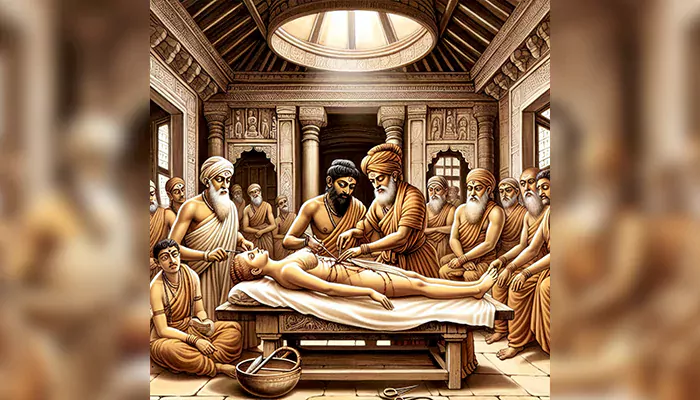
From atoms to algebra, surgery to space-time—these pioneering intellects shaped the world's scientific heritage before the modern age even began
Long before Newton's apple or Galileo's telescope, ancient India had already produced minds that wrestled with the cosmos, dissected human anatomy, hypothesised about atoms, and mapped the mathematics of infinity. These weren't merely sages or scholars; they were daring thinkers who stood at the intersection of science and philosophy.
They left behind treatises, not just myths; algorithms, not just metaphors. These ten figures remind us that India's contribution to global knowledge is neither marginal nor recent—it is civilisational.
In 499 CE, Aryabhata authored the Aryabhatiya, which transformed mathematics and astronomy. He defined zero not merely as a placeholder, but as a concept, which led to the development of the decimal system. He computed pi (π) to four decimal places and described the Earth's rotation centuries before Copernicus. His eclipse models, relying on shadows rather than divine wrath, marked a significant shift in observational astronomy.
Often regarded as the "Father of Surgery", Sushruta practised in the 6th century BCE and documented over 300 surgical procedures in the Sushruta Samhita. He described operations from cataract removal to skin grafting and fracture treatments. His emphasis on surgical ethics, hygiene, and anaesthetics predates modern medicine by thousands of years.

(Credit: ayurvedicclinic )
The Charaka Samhita, compiled by Charaka around the 2nd century BCE, is one of the most comprehensive ancient medical texts. Focusing on preventative health, balanced living, and diagnostics, Charaka's principles form the foundation of Ayurveda and continue to guide holistic medical practices worldwide.
Long before Leibniz or Newton, Bhaskara II in the 12th century CE pioneered early differential calculus. His Siddhanta Shiromani covers arithmetic, algebra, and planetary motion. He also delved into concepts such as infinity, time relativity, and instantaneous motion—ideas that were far ahead of their time.
A 7th-century polymath, Brahmagupta built on Aryabhata's idea of zero and formalised it mathematically in Brahmasphutasiddhanta. He established rules for operations involving zero and negative numbers, laid the foundations for algebra, and addressed complex astronomical problems such as lunar eclipses and planetary conjunctions.

Centuries before Dalton, the sage Kanad suggested that all matter is composed of indivisible particles called 'anu' or atoms. His Vaisheshika Sutras, composed around the 6th century BCE, detail atomic interactions, motion, and various energy types. He envisioned a universe governed by laws rather than whims, marking him as an early pioneer of empirical reasoning.
Not to be confused with the philosopher of emptiness, this Nagarjuna lived around the 2nd century CE and authored Rasaratnakara, a foundational text on metallurgy and alchemy. His work on distillation, alloys, and mercury processing laid early chemical foundations and had both medical and metallurgical impacts.
Varahamihira, a 6th-century scholar known for encyclopaedic knowledge, authored the Brihat Samhita, which covered geology, hydrology, meteorology, and astronomy. He accurately forecasted eclipses and rainfall patterns, transforming astronomical insights into mathematical formulas that integrated mysticism with scientific measurement.

(Credit: TOI )
Better known for his political acumen, Chanakya's Arthashastra also explores economics, statecraft, and administrative sciences. Written in the 4th century BCE, it predates Machiavelli by nearly 1,800 years. His sophisticated understanding of markets, taxation, and intelligence networks makes him one of the earliest practitioners of applied political science.
Through the Yoga Sutras, Patanjali formalised one of India's most profound intellectual traditions—Yoga. Beyond its physical postures, he introduced a rigorous framework for mental discipline, ethical behaviour, and self-realisation, blending philosophy with psychological science.